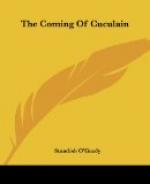social pastimes of the age; and to drink and be merry
in hall, but always without intoxication; and to respect
their plighted word and be ever loyal to their captains;
to reverence women, remembering always those who bore
them and suckled when they were themselves helpless
and of no account; to be kind to the feeble and unwarlike;
and, in short, all that it became brave men to feel
and to think and to do in war and in peace. Also
there were those who taught them the history of their
ancestors, the great names of the Clanna Rury, and
to distinguish between those who had done well and
those who had not done so well, and the few who had
done ill. And these their several instructors
appointed by Concobar Mac Nessa and the council of
his wise men were famous captains of the Ultonians,
and approved bards and historians. And over all
the high king of Ulster, Concobar Mac Nessa, was chief
and president, not in name only but in fact, being
well aware of all the instructors and all the instructed,
and who was doing well and exhibiting heroic traits,
and who was doing ill, tending downwards to the vast
and slavish multitude whose office was to labour and
to serve and in no respect to bear rule, which is
for ever the office of the multitude in whose souls
no god has kindled the divine fire by which the lamp
of the sun, and the candles of the stars, and the
glory and prosperity of nations are sustained and fed.
Such, and so supervised, was the Royal School of Emain
Macha in the days when Concobar Mac Nessa was King,
and when Fergus Mac Roy Champion, and when the son
of Sualtam, not yet known by his rightful name, was
a pupil of the same and under tutors and governors
like the rest, though his fond mother would have evaded
the law, for she loved him dearly, and feared for him
the rude companionship and the stern discipline, the
early rising and the strong labours of the great school.
CHAPTER VI
THE SMITH’S SUPPER PARTY
“Bearing on shoulders immense
Atlantean the weight,
Well nigh not to be borne,
Of the too vast orb of her
fate.”
Matthew Arnold.
One day, in the forenoon, a man came to Emain Macha.
He was grim and swarthy, with great hands and arms.
He made no reverence to Concobar or to any of the
Ultonians, but standing stark before them, spake thus,
not fluently:—“My master, Culain,
high smith of all Ulster, bids thee to supper this
night, O Concobar; and he wills thee to know that
because he has not wide territories, and flocks, and
herds, and tribute-paying peoples, only the implements
of his industry, his anvils and hammers and tongs,
and the slender profits of his labour, he feareth
to feast all the Red Branch, who are by report mighty
to eat and to drink; he would not for all Ireland
bring famine upon his own industrious youths, his
journeymen and his apprentices. Come therefore
with a choice selection of thy knights, choosing those




